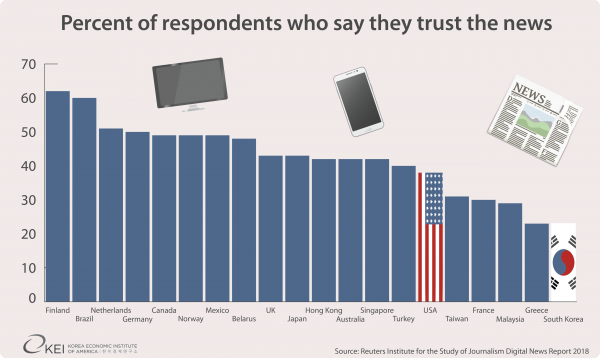The Peninsula
Korean Trust in the Media Remains Low, Despite Recent Victories for Press Freedom

By Jenna Gibson
In the United States, the rise of terms like “fake news” and “alternative facts,” as well as scandals about election manipulation through made-up news stories and biased sources have led to a spike in discussion about the inherent trustworthiness of the news media. However, when it comes to overall distrust in the news, the United States has nothing on South Korea.
According to the University of Oxford Reuters Institute’s 2017 Digital News Report, South Korea has the lowest trust in news out of the 36 countries surveyed around the world. Just 23 percent of Koreans said they trust news overall in that survey, and only 12 percent said that the news is free from political and business influence. By contrast, the United States also reported a low trust in news, just 38 percent, putting it at number 28 out of 36. The report, which has examined media consumption around the world since 2013, added Korea in 2016, and the results that year were about the same – 22 percent said they trusted the news, which was 25th out of the 26 countries surveyed (only ahead of Greece).
Another interesting finding in the 2017 report was that Koreans have a narrow gap between their trust of news overall (23 percent) and their trust in the news they personally consume (27 percent). In most other countries surveyed, that gap was significantly higher (38 percent vs. 53 percent in the US, for example), reflecting the fact that people presumably seek out and follow news outlets that they find particularly trustworthy. In Korea, however, the popularity of news aggregation platforms like Naver and Daum mean that people often consume the news through a third party. According to the Oxford researchers, “The small difference between overall trust and trust in the news I use, relates to the heavy use of portals, where people often don’t remember specific news brands.”
Several major scandals in the last few years have dealt major blows to Korean trust in the news media. Former President Park Geun Hye was accused of using South Korea’s strict defamation laws to silence critics in the media, causing many moderate to left-leaning publications to self-censor out of fear of prosecution. The Park administration was also criticized for manipulating major public broadcasters KBS and MBC by appointing conservative pro-Park CEOs to both organizations. Employees of both companies have protested these appointments on and off for years, culminating in a months-long strike last fall that eventually resulted in the removal of the two leaders. After the announcement that their strike was successful, the KBS Union released a statement reading, “We have only just removed the biggest hurdle that stood in the way of KBS becoming a true broadcasting company of the people. Our goal isn’t just to make KBS what it was 10 years ago, our goal is to end the broadcasting company’s shameful history of servitude and submission to power. We will create a KBS that touches the lives of our citizens and reflects their opinions and ideas.”
These issues are not just limited to Park Geun Hye’s time, however. Earlier this year, an online blogger known as “Druking” was accused of using a computer program to “like” comments on news stories on Naver, thus artificially inflating certain comments to make sure that they were shown first in the comment section below political stories, as well as writing critical comments. Police say he used as many as 2,000 online IDs at a time to manipulate Naver comment sections. The blogger was recently indicted along with three former members of the Minjoo Party, who were also allegedly participating in online opinion rigging. Naver has since announced that they are overhauling their news portal to prevent similar issues in the future, and hope to make their process more transparent to regain the trust of the public.
In the Reporters Without Borders annual World Press Freedom Index, South Korea fell from 31st in the world in 2006 to 70th in 2016, largely on the back of these influence scandals. But in 2017 the country returned to 63rd, and then jumped 20 places to hit 43rd in 2018’s report. According to the index, the media’s work to expose Park’s corruption, as well as President Moon’s efforts to end the MBC and KBS strikes were the main reasons for this improvement.
The Moon administration has openly stated that they want to make these issues a priority. Right after his election last summer, Moon’s team pledged to bring Korea back to 30th in the ranking, and listed that pledge fourth among the incoming administration’s 100 policy priorities. Solving the MBC/KBS issue shows he is serious in following through on this promise. But issues remain – the structure that allows the government to appoint managers at these broadcasters are still in place, leaving open the possibility for future influence. Plus, South Korea’s defamation laws allow for harsh punishments for a range of political and non-political speech, and could still be used to silence opponents of the government. By eliminating these structural issues within South Korea’s free speech landscape, as well as considering whether the National Security Law which criminalizes viewing of a wide range of North Korea-related material, Moon can ensure that his commitment to free speech lasts long after he leaves the Blue House.
Jenna Gibson is the Director of Communications at the Korea Economic Institute of America. The views expressed here are the author’s alone.
Photo by KEI Intern Minhee Lee
